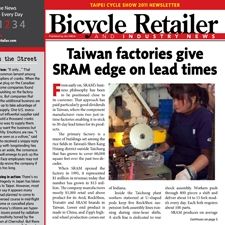TAICHUNG, Taiwan (BRAIN)—From early on, SRAM’s business philosophy has been to be positioned close to its customer. That approach has paid particularly good dividends in Taiwan, where the component manufacturer runs two just-in-time factories enabling it to stick to 30-day lead times for its products. (For more daily coverage from the Taipei Cycle Show, click on the PDF by clicking on the title and then "Visit Link").
The primary factory is a maze of buildings set among rice fields in Taiwan’s Shen Kang Hsiang district outside Taichung that has grown to cover 60,000 square feet over the past two decades. When SRAM opened the factory in 1991, it represented $1 million in revenue; today that number has grown to $13 million.
The company manufactures mostly $1,000 retail and above product for its Avid, RockShox, Truvativ and SRAM brands in Taiwan. Lower end product is made in China, and Zipp’s high-end wheel production comes out of Indiana.
Inside the Taichung plant workers stationed at U-shaped pods keep five RockShox suspension fork assembly lines running during nine-hour shifts. A sixth line is dedicated to rear shock assembly. Workers push through 800 pieces a shift and deliver about 14 to 15 fork models every day. Each fork requires about 100 parts.
SRAM produces on average 80 percent of all of its in-house parts inside the factory in a vast machining area. Of the parts that aren’t produced by SRAM, 90 percent are sourced in Taiwan. SRAM also makes many of its own machines for its production.
Keeping as much production under its roof as possible is all about price and quality control, said David Zimberoff, SRAM’s global marketing manager during a tour of the factory on Thursday.
SRAM puts a huge focus on quality control and each product is marked with a bar code that allows it to be traced back as far as the raw material stage. Any quality issues can be traced back to the line the product rolled off of and the operator in control.
“That’s one of our competitive advantages,” Zimberoff said. The Taichung factory also includes R&D, testing, painting, anodizing and injection molding operations. Total annual output is about two million cassettes, one million forks, and half-million shifters.
About 30 minutes away, a second smaller factory acquired as part of SRAM’s Truvativ purchase in 2004, is dedicated largely to carbon fiber production of cranksets, derailleur cages and shifter levers.
Sheets of carbon fiber are sourced domestically from Taiwan, as well as Japan, and a seven-day supply is stored in industrial-sized walk-in freezers to prevent the carbon fiber from curing in room temperature.
The carbon fiber is cut, then molded into the proper shape before it’s heat treated, de-flashed, polished, finished and decaled by women with precise handwork. The factory can churn out about 3,000 aluminum and carbon fiber cranksets daily.
This year, the factory will be taking on production of SRAM carbon fiber wheelsets. Some assembly of internal gear hubs previously made in SRAM’s Germany factory will be moved here by the end of the year.
SRAM also has factories in China, Germany and Portugal and offices in Chicago, Colorado Springs, Germany, The Netherlands, Ireland and San Luis Obispo, California, employing 2,500 people worldwide.
For more coverage on Taipei Cycle, click on the PDF above.
—Nicole Formosa
nformosa@bicycleretailer.com




